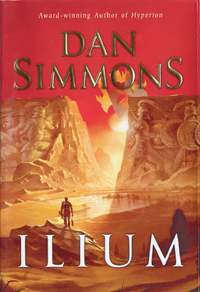 |
|
|
"This novel is dedicated to Wabash College—its men, its faculty, and its legacy." - Dan Simmons ’70.
|
"This novel is dedicated to Wabash College—its men, its faculty, and its legacy."
When was the last time you could walk into any Borders, Barnes & Nobles, or independent bookseller and read that inscription? Check out Ilium by Dan Simmons ’70.
The follow-up to the Hyperion novels that placed Simmons among the most respected writers of science fiction and became one of the most acclaimed and popular series in contemporary science fiction, Ilium is told, in part, by an unwillingly resurrected former classics scholar from Indiana. Simmons carries readers to a future reenactment of the Trojan War (not to mention an evening with Helen of Troy), through trysts and conflicts with the gods on Mars’ Mt. Olympos, across galaxies and back and forth in time while morphing into different characters, faxing and forecasting through various states of existence.
This is liberal arts science fiction, with enough proto-Greeks and gods to enthrall Jack Charles; references to great literature (not to mention krakens and voynixes) to cheer Simmons’ mentors Walt Fertig and Bert Stern; and religious implications worthy of a senior seminar, underpinned by enough physics, biology, and astronomy (quantum teleportation) to be a freshman tutorial in science.
And continuing a Simmons tradition of weaving Wabash friends into his work, the writer’s resurrected scholar is named Hockenberry, after Dan’s close friend and fellow writer at Wabash, Duane Hockenberry ’70. Even Simmons’ classmate and DePauw classics professor Keith Nightenhelser ’71 makes cameo appearances as his resurrected self ("a friendly bear of a man") throughout the book, including the last scene, set among prehistoric men and women in Indiana, 1200 B.C.
Publisher’s Weekly called Ilium "an elegant monster of a novel, beautifully written, chock full of literary references, grand scenery and fascinating characters—Simmons at his best."
The New York Times warned readers that the novel is part one of a series, so "for answers to the mysteries laid out in Ilium, you will have to wait for the promised sequel. For now, matching wits with Simmons and his lively creations should be reward enough."
The Washington Post called Ilium "a doozie" of a novel, and Library Journal echoes, "highly recommended."
But the community to whom the book is dedicated heard the story first. Simmons returned to campus in April before the book’s publication and read from his author’s proof of the book for an audience packed into Center 216. And as life imitates fiction, Nightenhelser was there, too, once again among cavemen (and women), circa 2003.
(Read more about Ilium and Simmons at http://www.dansimmons.com)